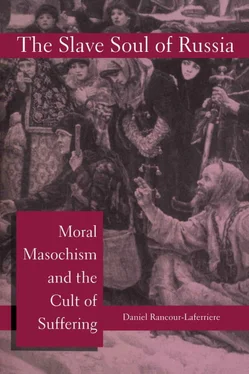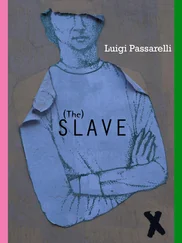Daniel Rancour-Laferriere
THE SLAVE SOUL OF RUSSIA
MORAL MASOCHISM AND THE CULT OF SUFFERING
Господи помилуй, как мучительно трудно быть русским! Ибо ни один народ не чувствует столь глубоко тяги земной и нет на земле бóльших рабов божьих , чем мы, Русь.
Lord have mercy, how agonizingly difficult it is to be Russian! For there is no other people which feels the earth’s pull so profoundly, and there are no greater slaves of God on this earth than we, Rus’.
—Maksim Gor’kii
This book owes its title and chief inspiration to the Soviet Russian writer Vasilii Semenovich Grossman (1905–64). In his pessimistic novella Forever Flowing Grossman explains Russia’s uniqueness by its “slave soul.” Russia is a land of endless suffering, according to Grossman, because Russians typically cannot overcome their self-defeating slavishness.
If there was anything to what Grossman was saying, I thought when I first read him, then the psychoanalytic theory of moral masochism ought to apply to the Russians. Nearly one thousand footnotes later, I have become convinced that Grossman was correct, for I have been able to document the widespread occurrence of moral maoschism in various spheres of Russian culture.
Work on this book has been supported over the years by Faculty Research Grants (1988–93) from the University of California, Davis. The book also benefited from an International Research and Exchanges Board travel grant to the Soviet Union in 1990.
Portions of the book have been presented orally at meetings of the American Association for the Advancement of Slavic Studies (1992), the American Historical Association (1994), and the UC Davis Humanities Institute (1993).
Many individuals have offered constructive criticism of my work as it progressed. Barbara Milman listened incredulously but patiently as I tried to describe for her the things Russians do. Yuri Druzhnikov sat with me for hours explaining how to interpret certain mysterious Russian proverbs. My Moscow friends Vera Loseva, Aleksei Lunkov, Svetlana Kapelush, Lev Tokarev, Konstantin Pimkin, and Gayane Grigorian showered me with vivid anecdotes about masochism in Russia. Others who offered valuable comments include: Lois Becker, David Brodsky, Patricia Brodsky, Catherine Chvany, Toby Clyman, Robert O. Crummey, Joel Friedman, Jim Gallant, Musya Giants, Ben Hart, Kent Hart, Joanna Hubbs, Kathryn Jaeger, Gary Jahn, D. Barton Johnson, Lola Komarova, Ronald LeBlanc, Anna Leibovich, Yuri Mamleev, Karl Menges, Sidney Monas, Hugh Ragsdale, Steven Rosen, Gary Rosenshield, Charlotte Rosenthal, Anna Wierzbicka, and Elizabeth Wood. Helpful bibliographic assistance was provided by Opritsa Popa, as well as by Donald Beene, Frank Goodwin, Andre Janitzky, Shidan Lotfi, and Russel Schwartz. Special thanks go to Jackie DiClementine for her marvelous wordprocessing skills.
All translations into English are mine unless otherwise noted. A Russian translation of this book is in preparation.
Russian history offers numerous examples of the exploitation and debasement of human beings.
After the Mongols invaded in the mid-thirteenth century they extracted obeisance, financial tribute, and military assistance from the princes of Rus’ lands for at least the next century and a half. As the Mongols lost their grip, the Muscovite state expanded, its tsar enforcing unrestricted despotic rule over all citizens.
By degrees, starting roughly at the end of the fifteenth century, Russian peasants became more and more obliged to their landowning masters. From the late sixteenth century, they—that is, the vast majority of the rural Russian population—were bound from cradle to grave as serfs to their masters (or to the state directly), and they were not released from this form of involuntary servitude until 1861.
The Russian Orthodox Church, since the time of Peter the Great, was under the thumb of tsarist authority, and after the 1917 Revolution has endured periods of anti-religious persecution.
Russian women of all historical periods have been victimized by their men, whether they were being beaten for disobedience in accordance with the principles of the sixteenth-century Domostroi , or were holding down full-time jobs while at the same time being responsible for the bulk of household labor in the twentieth-century Soviet state.
For nearly three decades during the Soviet period of Russian history, forced labor was a way of life for the millions of inhabitants of the so-called gulag or system of concentration camps. Both Western and Soviet historians have acknowledged that this was outright slavery. 1With the onset of collectivization in the 1930s an aspect of serfdom was reinstated, for a large portion of the Soviet population was restricted by means of an internal passport system to living in designated agricultural areas.
To this day ordinary Russian citizens, who often have difficulty obtaining the minimum goods and services necessary for subsistence, contribute to the production of certain goods and services which only an elite class, formerly known as the nomenklatura, has access to.
These facts are very diverse, and they are of course somewhat oversimplified. But a general picture emerges which is accurate—and appalling. The sheer quantity and diversity of suffering that has gone on in Russia, and still goes on there, boggles the Western mind.
The American psychoanalyst Edmund Bergler treated a class of masochistic neurotics whom he termed “injustice collectors.” I know of no nation which has collected more injustices for itself than has Russia.
What are the causes of the great suffering that goes on in Russia? Whence the Russian “need to suffer” (“potrebnost’ stradaniia”) 2—as Dostoevsky put it? Who is to blame?—to ask the perennial Russian question.
Russia is customarily characterized as an “authoritarian” or “patriarchal” culture. This is no doubt true, but the very terms tend to attract blame toward those exercising “authority,” and draw analytic attention away from those over whom “authority” is exercised, that is, away from those who do the suffering and who might possibly be complicitous in the “authoritarianism.”
In the political and historical spheres, for example, this means (or has meant in the past) undue attention to leaders and inadequate attention to the servile psychology of subordinates and ordinary Russians. I am inclined to agree with Nicholas Vakar: “historians who have written that the tyranny of the Tsars conditioned the nation to accept the tyranny of the Communists have missed the fact that Russian habits of obedience have been the cause, not the result, of political autocracy.” 3
In the gender sphere exaggerated attention to authority has meant a certain kind of male chauvinism, even among those feminist critics of Russia who are so busy blaming the pampered Russian male ego for female oppression that the female psyche goes unexamined.
Analogous statements could be made for other spheres of Russian life. Little effort has been made to understand just how the Russians manage to consistently get themselves into situations where they appear to have no choice but to submit and to suffer. How did Russians come to acquire their well-deserved epithet of “long-suffering people” (“terpelivyi narod”)? Or, to utilize an alliterative epithet recently invented by poet Andrei Voznesenskii, why has Russia always been a “country of suffering” (“strana stradan’ia”)? 4
The Soviet prose writer Vasilii Grossman proffered his controversial notion that the “Russian soul” is by nature a “slave” (“raba”). 5This is a metaphorical characterization of the phenomenon in question, not an explanation of it. But, frankly, literary artists have exerted more effort in this area than anyone else, and their explorations have been very fruitful. Grossman is hardly alone. All of Dostoevsky’s major novels, for example, offer insights into masochism. The poetry of Blok is filled with suffering welcomed by the sufferer. Much of Solzhenitsyn’s writing glorifies suffering behind prison walls. And so on.
Читать дальше












